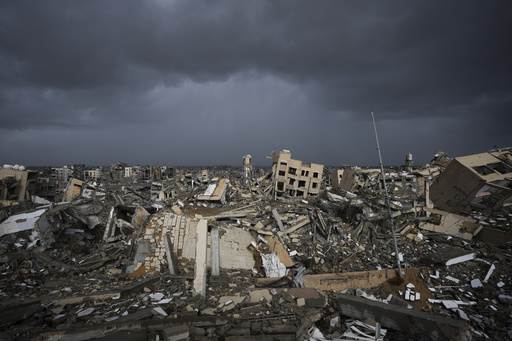
Israel’s Defense Minister has announced that he has directed the military to develop plans that could lead to a significant number of Palestinians leaving the Gaza Strip. This initiative aligns with a proposal from former President Donald Trump regarding the future of the war-torn region.
Minister Israel Katz expressed his support for Trump’s “audacious plan,” stating that it could facilitate the exit of many individuals from Gaza to various locations around the globe. He outlined that the preparations would encompass options for departing via land, as well as provisions for exits by sea and air.
Katz did not clarify whether the Palestinians would eventually be allowed to return to Gaza, a territory that has been largely devastated due to Israel’s 15-month military operation against Hamas. Trump’s proposal suggests that a majority of Gaza’s 2.3 million inhabitants be “permanently” resettled, while the United States would oversee the reconstruction of the area.
The Palestinian community has strongly opposed the idea of relocating and insists on remaining in their homeland. Trump’s plan has been overwhelmingly rejected by Palestinians, along with a significant portion of the international community. Human rights organizations have argued that such movements could constitute forced displacement, violating established international laws. Though U.S. officials later interpreted the relocation as a temporary measure, Palestinians remain apprehensive that Israel may inhibit their return, exacerbating a refugee crisis that has roots dating back to the founding of the Israeli state.
In recent developments, Egyptian authorities are engaging in behind-the-scenes diplomatic efforts to counteract Trump’s suggestion regarding the mass relocation of Palestinians from Gaza.
Egypt has cautioned that implementing such a strategy could jeopardize its longstanding peace treaty with Israel, which has been a pillar of stability and a key element of American influence in the region for decades. While Egyptian President Abdel-Fattah el-Sissi has not made public comments addressing this new proposition, anonymous officials indicate that Cairo has communicated its unwillingness to accept such a plan to both the Trump administration and Israel. They stressed that the decades-old peace agreement with Israel stands at risk.
Reports from a Western diplomat in Cairo, who also wished to remain unnamed due to the sensitive nature of the ongoing discussions, confirmed that Egypt signaled its strong disapproval of the plan through various channels, asserting that it poses a danger to its national security.
This diplomat noted that Egypt had previously dismissed similar proposals made by the Biden administration and European nations during the conflict, particularly following Hamas’ attack on October 7, 2023, which instigated the hostilities. The earlier discussions had been conducted privately, in stark contrast to Trump’s public announcement of his plan during a White House press event shared with Israeli Prime Minister Benjamin Netanyahu.
In another update from the region, the Israeli military has reported the deaths of two soldiers and severe injuries to another due to an unfortunate accident involving a crane in the Gaza border area.
This incident marks the first fatalities of Israeli soldiers in Gaza since the initiation of a ceasefire last month, which had brought a halt to the 15-month conflict that began with Hamas’ attack on October 7.
Under the terms of the ceasefire, Israeli forces have largely withdrawn from significant portions of Gaza, with operations now concentrated primarily along the border. The military has issued warnings to Palestinians to steer clear of areas where soldiers remain active and has taken action against individuals deemed to be violating the ceasefire agreements.
Currently, Hamas is preparing to release a total of 33 hostages taken during the initial attack in a deal that trades them for an equal number of Palestinian prisoners in Israeli custody. However, discussions regarding the second phase, which would involve additional hostages being released in exchange for a larger number of prisoners and a sustainable ceasefire, remain unresolved.

